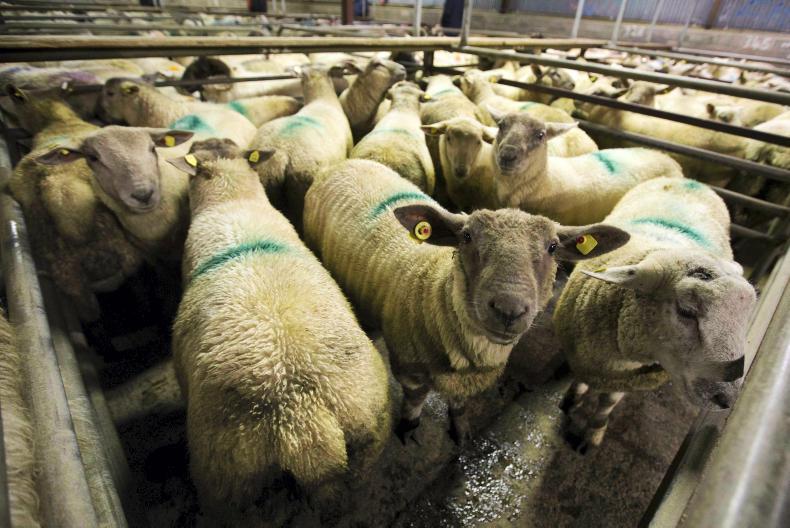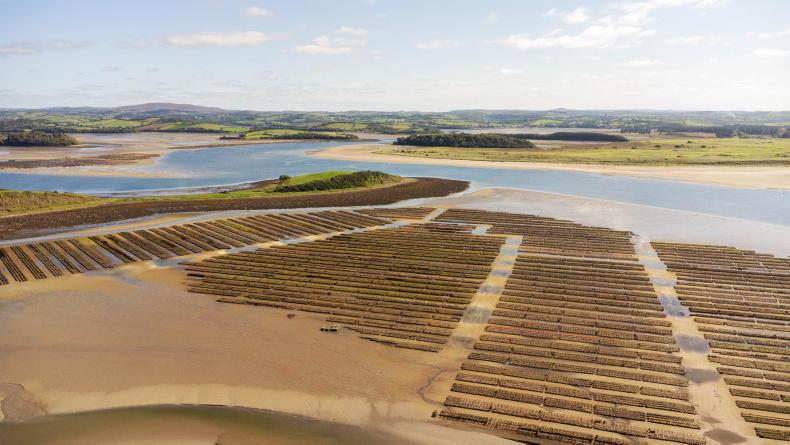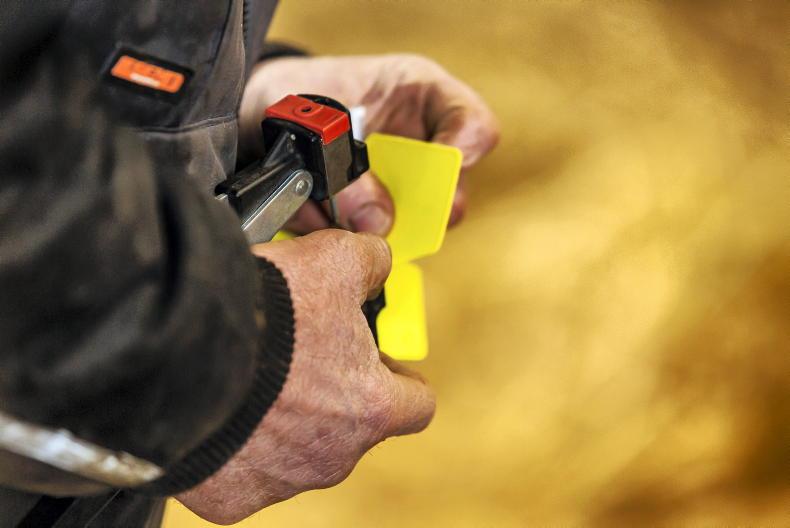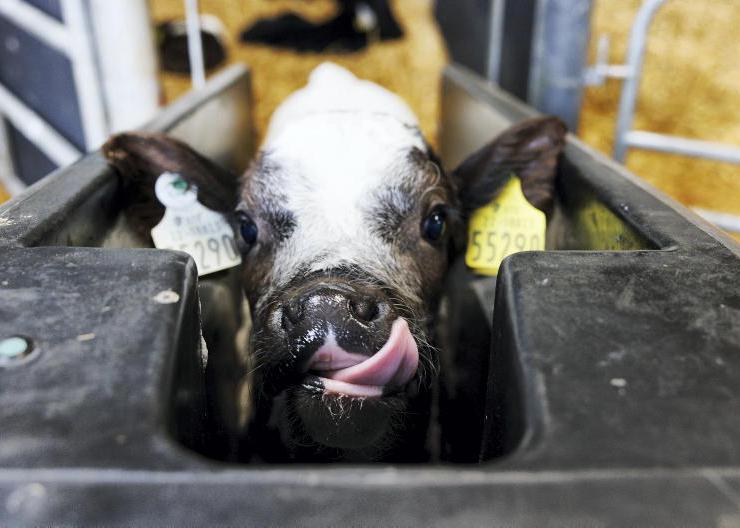The number of marts approved to operate as a Central Point of Recording (CPR) has increased significantly in the last couple of months.
There are now 24 marts on the approval list published on the Department of Agriculture website. These marts are listed in on this page.
They join the five main export-orientated sheep processing plants who were approved as a CPR shortly after mandatory electronic tagging was introduced on 1 June 2019.
Most mart managers and factories report that operating as a CPR is working relatively smoothly.
To operate as a CPR, the mart or factory must scan electronic tags of sheep in a batch and present producers with a printed list of tag numbers corresponding to the serial number barcode on the dispatch document.
This means there is no requirement for farmers to read and record tag numbers on the dispatch document accompanying the sheep.
Farmers can still record tag numbers if they wish. However, it is mandatory to complete and record data on quality assurance status and food chain information (back of dispatch document), where applicable, along with denoting the destination of sheep.
List of tag numbers
In general the CPRs are providing farmers with a list of tag numbers on the day sheep are traded while some factories are circulating this list with the remittance where producers are not waiting until sheep have been slaughtered.
It is important to note that this list must be retained for a period of at least three years (similar to all movement records).
Some farmers store these in a folder while others affix them to the yellow copy of the dispatch document. The method makes no difference as long as they can be made available in the case of an inspection.
It should also be noted that where farmers have their own electronic reading equipment and printing facilities they can read the tag numbers, print out the list and affix it to the copy of the dispatch document. A copy should also be retained for personal records.
Sheep purchases
Marts acting as CPRs will also provide the purchaser of sheep with a printed list of tag numbers to accompany the white dispatch document or a replica of the dispatch containing the tag numbers. The Department advises it is important to check that the listing of tag numbers received matches the number of sheep in the batch and that the serial number on the dispatch document matches the serial number on the tag list.
CPRs in action
CPRs differ in their operation. Some operators are recording tag numbers on entry to the facility while many are recording tag numbers of the batch once sheep have been unloaded and penned.
This is particularly the case where there are big entries and pressure on intake points. Where tag numbers cannot be read with an electronic reader, the CPR must manually read the tag number and record it.
Grant aid
The Department of Agriculture is strongly incentivising marts to operate as a CPR. The original subvention of 40% of the verified development costs announced earlier this year by Minister for Agriculture Michael Creed was later doubled to 80% grant aid on a maximum payment of €15,000 per mart. The funding is available for upgrading of facilities to enable marts to operate as a CPR. Eligible investments under the scheme as listed on the scheme terms and conditions include;
Wi-Fi installation / upgrading:
Purchase of electronic reading equipment required for effective operation as a CPR.Software development to enable the provision of a list of presented tag numbers to keepers and to enable interaction with the DAFM AIM database via webservices.Hardware purchase/ upgrading.Purchase of mobile tablet computers, as required to operate effectively as a CPR.The Department has confirmed funding for this scheme is provided for 2019 only and to-date, 32 marts have submitted applications for the associated grant aid.
It adds that subject to meeting the relevant criteria it is anticipated that 32 marts will be operating as CPRs shortly.
Factories and sheep marts operating as a Central Point of Recording
Factories:
Dawn Meats Ballyhaunis: Clare Road, Ballyhaunis, Co Mayo.Irish Country Meats Camolin: Bayland, Camolin, Co Wexford.Irish Country Meats Navan: Mullaghboy Industrial Estate, Navan, Co Meath.Kepak (Athleague) Ltd: Athleague, Co Roscommon.Kildare Chilling Company: Kildare Town, Co Kildare.Mart centres:
Aurivo Co-Op Livestock Mart (Ballinrobe): Claremorris Road, Ballinrobe, Co Mayo.Ballymote Mart: Fairgreen Road, Ballymote, Co Sligo.Blessington Mart: Hollyvalley Blessington, Co Wicklow.Burke’s (Maam Cross) Livestock Mart: Maam Cross, Recess, Co Galway.Carnaross Mart: Carnaross, Kells, Co Meath.Carnew Mart: 34 Main Street, Carnew, Co Wicklow.Central Auctions Services Co-Op Society Ltd:Roscrea Mart, Parkmore, Roscrea, Co Tipperary.Clare Co-Operative Marts: Quin Road, Ennis, Co Clare.Cork Cooperative Marts Ltd (Cahir): Cashel Rd, Cahir, Co Tipperary.Cork Cooperative Marts Ltd (Fermoy): Corrin, Fermoy, Co Cork.Cork Cooperative Marts Ltd (Macroom): Sleveen East, Macroom, Co Cork.Dingle Mart: Spa Road, Dingle, Co Kerry.Enniscorthy Livestock Mart: Wexford Farmers Co-Op, Old Dublin Rd, Enniscorthy Co Wexford.Golden Vale Co Op Mart Ltd (Tullamore): Ardan Road, Tullamore, Co Offaly.Golden Vale Mart (Carrigallen): Carrigallen, Co Leitrim.Headford Co Op Mart Ltd: Balrickard Headford, Co Galway.Inishowen Co-op Society Livrestock Mart: Moville Road, Carndonagh, Co Donegal.Iveragh Coop Farmers Mart: Reenrusheen, Carhan Lower, Cahirciveen, Co Kerry.Kenmare Mart: Gortamullen, Kenmare. Co Kerry.Kilkenny Co Op Livestock Mart Ltd: Cillin Hill, Dublin Road, Kilkenny.Roscommon Co-Operative Livestock Marts Ltd: Circular Road, Roscommon.Tuam Co-Operative livestock Mart ltd: Vicar Street, Tuam, Co Galway.Tullow Livestock Sales Ltd: The Green, Tullow, Co Carlow.Waterford Ross Marts Ltd: Rosbercon, New Ross, Co Wexford.
The number of marts approved to operate as a Central Point of Recording (CPR) has increased significantly in the last couple of months.
There are now 24 marts on the approval list published on the Department of Agriculture website. These marts are listed in on this page.
They join the five main export-orientated sheep processing plants who were approved as a CPR shortly after mandatory electronic tagging was introduced on 1 June 2019.
Most mart managers and factories report that operating as a CPR is working relatively smoothly.
To operate as a CPR, the mart or factory must scan electronic tags of sheep in a batch and present producers with a printed list of tag numbers corresponding to the serial number barcode on the dispatch document.
This means there is no requirement for farmers to read and record tag numbers on the dispatch document accompanying the sheep.
Farmers can still record tag numbers if they wish. However, it is mandatory to complete and record data on quality assurance status and food chain information (back of dispatch document), where applicable, along with denoting the destination of sheep.
List of tag numbers
In general the CPRs are providing farmers with a list of tag numbers on the day sheep are traded while some factories are circulating this list with the remittance where producers are not waiting until sheep have been slaughtered.
It is important to note that this list must be retained for a period of at least three years (similar to all movement records).
Some farmers store these in a folder while others affix them to the yellow copy of the dispatch document. The method makes no difference as long as they can be made available in the case of an inspection.
It should also be noted that where farmers have their own electronic reading equipment and printing facilities they can read the tag numbers, print out the list and affix it to the copy of the dispatch document. A copy should also be retained for personal records.
Sheep purchases
Marts acting as CPRs will also provide the purchaser of sheep with a printed list of tag numbers to accompany the white dispatch document or a replica of the dispatch containing the tag numbers. The Department advises it is important to check that the listing of tag numbers received matches the number of sheep in the batch and that the serial number on the dispatch document matches the serial number on the tag list.
CPRs in action
CPRs differ in their operation. Some operators are recording tag numbers on entry to the facility while many are recording tag numbers of the batch once sheep have been unloaded and penned.
This is particularly the case where there are big entries and pressure on intake points. Where tag numbers cannot be read with an electronic reader, the CPR must manually read the tag number and record it.
Grant aid
The Department of Agriculture is strongly incentivising marts to operate as a CPR. The original subvention of 40% of the verified development costs announced earlier this year by Minister for Agriculture Michael Creed was later doubled to 80% grant aid on a maximum payment of €15,000 per mart. The funding is available for upgrading of facilities to enable marts to operate as a CPR. Eligible investments under the scheme as listed on the scheme terms and conditions include;
Wi-Fi installation / upgrading:
Purchase of electronic reading equipment required for effective operation as a CPR.Software development to enable the provision of a list of presented tag numbers to keepers and to enable interaction with the DAFM AIM database via webservices.Hardware purchase/ upgrading.Purchase of mobile tablet computers, as required to operate effectively as a CPR.The Department has confirmed funding for this scheme is provided for 2019 only and to-date, 32 marts have submitted applications for the associated grant aid.
It adds that subject to meeting the relevant criteria it is anticipated that 32 marts will be operating as CPRs shortly.
Factories and sheep marts operating as a Central Point of Recording
Factories:
Dawn Meats Ballyhaunis: Clare Road, Ballyhaunis, Co Mayo.Irish Country Meats Camolin: Bayland, Camolin, Co Wexford.Irish Country Meats Navan: Mullaghboy Industrial Estate, Navan, Co Meath.Kepak (Athleague) Ltd: Athleague, Co Roscommon.Kildare Chilling Company: Kildare Town, Co Kildare.Mart centres:
Aurivo Co-Op Livestock Mart (Ballinrobe): Claremorris Road, Ballinrobe, Co Mayo.Ballymote Mart: Fairgreen Road, Ballymote, Co Sligo.Blessington Mart: Hollyvalley Blessington, Co Wicklow.Burke’s (Maam Cross) Livestock Mart: Maam Cross, Recess, Co Galway.Carnaross Mart: Carnaross, Kells, Co Meath.Carnew Mart: 34 Main Street, Carnew, Co Wicklow.Central Auctions Services Co-Op Society Ltd:Roscrea Mart, Parkmore, Roscrea, Co Tipperary.Clare Co-Operative Marts: Quin Road, Ennis, Co Clare.Cork Cooperative Marts Ltd (Cahir): Cashel Rd, Cahir, Co Tipperary.Cork Cooperative Marts Ltd (Fermoy): Corrin, Fermoy, Co Cork.Cork Cooperative Marts Ltd (Macroom): Sleveen East, Macroom, Co Cork.Dingle Mart: Spa Road, Dingle, Co Kerry.Enniscorthy Livestock Mart: Wexford Farmers Co-Op, Old Dublin Rd, Enniscorthy Co Wexford.Golden Vale Co Op Mart Ltd (Tullamore): Ardan Road, Tullamore, Co Offaly.Golden Vale Mart (Carrigallen): Carrigallen, Co Leitrim.Headford Co Op Mart Ltd: Balrickard Headford, Co Galway.Inishowen Co-op Society Livrestock Mart: Moville Road, Carndonagh, Co Donegal.Iveragh Coop Farmers Mart: Reenrusheen, Carhan Lower, Cahirciveen, Co Kerry.Kenmare Mart: Gortamullen, Kenmare. Co Kerry.Kilkenny Co Op Livestock Mart Ltd: Cillin Hill, Dublin Road, Kilkenny.Roscommon Co-Operative Livestock Marts Ltd: Circular Road, Roscommon.Tuam Co-Operative livestock Mart ltd: Vicar Street, Tuam, Co Galway.Tullow Livestock Sales Ltd: The Green, Tullow, Co Carlow.Waterford Ross Marts Ltd: Rosbercon, New Ross, Co Wexford. 








SHARING OPTIONS